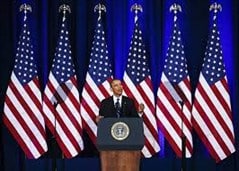
Speaking from a set that could have been designed by Leni Riefenstahl, President Obama yesterday informed us that not only does our freedom depend on the work of spies, but the very birth of our republic was dependent on the same kind of surveillance network that so many are criticizing today. Critics, therefore, are not only unpatriotic but deeply anti-American. The message was clear: “surveillance equals freedom.”
As Constitutional scholar Michael Ratner of The Real News Network points out, if Obama wanted his speech to reassure critics of an intelligence community that has seemingly turned its lens inward, he got it precisely backwards. He did not come out and acknowledge from the start that given recent revelations about NSA surveillance of US phone calls, computers, text messages, etc, our concerns are legitimate and he intends to do something about it. He did not affirm the importance of protecting the First and Fourth Amendments. He did not come out preaching real and concrete reform.
Instead, the president opened his speech placing himself clearly on the side of the surveillance state and opposed to citizens.
He told us that “the folks at NSA and other intelligence agencies are our neighbors. They’re our friends and family.”
Well that was true in East Germany under the Stasi as well. Is that supposed to reassure us? Are we supposed to feel better that our neighbors, friends, and family are part of an enormous domestic spying network looking into the lives of others?
Obama’s speech was devoid of any concrete item of reform. There were no specific fixes presented by the president because he does not really believe that anything is broken. It is a perception problem, and the president intends to take a close look at the recommendations made by his hand-picked intelligence review commission.
He vows to strengthen executive branch oversight of intelligence, which would in effect be strengthening the source of the problem and closing the system to outside oversight. Congress seems little bothered by this.
He wants to introduce new, unspecified measures for more “transparency” in the process.
He will ask Congress to “authorize the establishment of a panel of advocates from outside government to provide an independent voice” in some cases before the FISA court. Even this seemingly concrete proposal is incredibly vague. Who will these advocates be? Who will pay them? To whom will they answer?
Adding an additional layer to the bureaucracy to give the appearance of a “peoples’ advocate” sounds more like something out of the old Soviet Union. It is a terrible idea.
The American people already have an advocate. It is called the US Constitution.
The president ended his speech with a Cold War-inspired flourish: you sure would never see this little speech given in Russia or China!
It was a dose of the American exceptionalism that is the neocons stock-in-trade:
No one expects China to have an open debate about their surveillance programs, or Russia to take privacy concerns of citizens in other places into account. But let’s remember: We are held to a different standard precisely because we have been at the forefront of defending personal privacy and human dignity.
The truth is this speech could have been given by surveillance state uber-hawk Rep. Peter King (R-NY). It was a return to the “9/11 changed everything” argument that has been the standard excuse for the list of abuses aimed at those of us who had nothing to do with 9/11. The fact that it was delivered by Obama tells us that he and King are on the same side of this issue. For the surveillance state. And against us.
